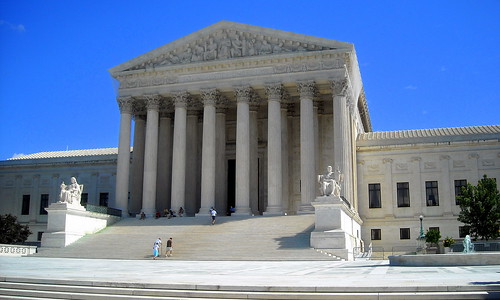
Supreme Court Rehears Citizens United Case; Decision Could Impact Nonprofits
9/15/2009

Citizens United, a 501(c)(4) nonprofit organization, developed and sought to run a film about candidate Hillary Clinton during the 2008 presidential primary. The group also wanted to promote the film with several ads. The highly critical movie was partially funded by corporate contributions, which the Federal Election Commission (FEC) said was a violation of the Bipartisan Campaign Reform Act of 2002 (BCRA). In a federal lawsuit recently reheard by the U.S. Supreme Court, Citizens United charges that ads for the film should not be subject to donor disclosure and disclaimer requirements and that the BCRA provisions enforced by the FEC are unconstitutional.
BCRA, sponsored by Sens. John McCain (R-AZ) and Russ Feingold (D-WI), prevents corporations (including nonprofit organizations) and labor unions from using general treasury funds to pay for any "electioneering communications" – broadcast messages that refer to a federal candidate 30 days before a primary election and 60 days before a general election.
The case was first heard by the Supreme Court in March, but in a surprising move a few months later, the Court asked Citizens United and the government to reargue the case in order to give the Court the opportunity to consider a broader set of questions regarding campaign finance law. In June, the Court requested an examination of whether two previous decisions that upheld the government's right to limit corporate expenditures in political campaigns should be overturned, specifically the 1990 decision in Austin v. Michigan State Chamber of Commerce and the 2003 decision in McConnell v. Federal Election Commission that dealt with BCRA.
The Court met in special session on Sept. 9 for a second hearing of Citizens United v. Federal Election Commission, and one outcome may be that the Court allows businesses and unions to spend without restraint in a way that could help their candidates of choice. At issue in the case is whether corporate money can be used to directly advocate for the election or defeat of federal candidates.
Shortly after arguments concluded, the Court released audio to the public. The New York Times reported, "The makers of a slashing political documentary about Hillary Rodham Clinton were poised to win. The only open question was how broad that victory would be." The film was called Hillary: The Movie.
Elena Kagan, the Solicitor General of the United States, all but said "that a loss for the government would be acceptable, so long as it was on narrow grounds." Suggesting that the campaign finance restrictions were perhaps not meant to be applied to a corporation like Citizens United, Kagan argued that if the Court overturned Austin, companies could use the funds to promote political positions at odds with the interests of some of their shareholders, and therefore, the Court should not go that far, even if it finds in favor of Citizens United.
While Chief Justice John Roberts and Justice Samuel Alito appear to remain skeptical of that argument, corporations are not stripped from political speech entirely during campaigns. Rather, corporations and unions pay for federal election spending through political action committees.
Further, the Court has supported the ban on independent spending by corporations in the past. In McConnell, the Court upheld the electioneering communications provision, and Austin upheld a state's right to restrict direct corporate spending in political campaigns.
Theodore Olson, representing Citizens United, remained committed in calling for a broad ruling by reversing the two precedents. This prompted Justice Sonia Sotomayor's first question as a justice. "Are you giving up on your earlier arguments that there are statutory interpretations that would avoid the constitutional question?" she asked.
The Court could ultimately avoid constitutional questions by ruling that BCRA does not apply to video-on-demand services, which is where Citizens United's film would have aired in 2008, though Court watchers say such an opinion would have been more likely in March. Another possible outcome is expanding an exemption to the general ban on corporate campaign spending for some nonprofit corporations. This approach would be based on a previous Supreme Court case, FEC v. Massachusetts Citizens for Life, which created what is known as the "MCFL exemption." "MCFL groups" are "organization[s] formed for the express purpose of promoting political ideas, have no shareholders, are not established by a business corporation or labor union, and do not accept contributions from those entities," according to the Court. Expanding the scope of MCFL to include groups like Citizens United could allow MCFL groups to take some corporate funding.
Observers have speculated on what the outcome of the Citizens United case could mean for nonprofit corporations. Past examples show that many business corporations are reluctant to spend directly on political ads, presumably for fear of alienating customers, shareholders, and employees. Instead, they channel such spending through groups like Citizens United, the U.S. Chamber of Commerce, and trade associations, almost all of which are tax-exempt, nonprofit corporations. If the Court's decision allows a significant increase in such spending, as supporters of the current prohibition strongly believe will occur, it will create pressure in two areas when it comes to tax-exempt (but not charitable) entities.
First, these entities can only maintain a 501(c)(4) tax-exempt status or a 501(c)(6) status if political activity is not their "primary" activity, which is not clearly defined.
Second, it is not clear what constitutes "political activity." The Internal Revenue Service (IRS), for example, applies "a facts and circumstances" test to determine political activity, and that test is both subjective and ambiguous at best; the IRS is the agency charged with oversight of nonprofit organizations' tax-exempt status. The FEC, responsible for enforcing campaign finance laws, applies equally vague tests.
The Court will now work toward a decision, and a final ruling may not be complete until after the new Court term begins Oct. 5.
Image in teaser by flickr user NCinDC, used under a Creative Commons license.


